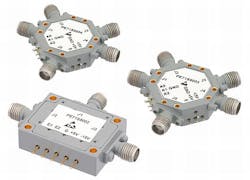PIN diode switches for common defense and commercial applications introduced by Pasternack
These RF and microwave PIN diode switches from Pasternack also are constructed to meet typical military specifications in areas such as vibration, shock, temperature and humidity. The family of switches comes in low insertion loss, high isolation, and high speed modules, covering a frequency range of 1 to 12 GHz.
When signal integrity and performance are a critical component of system functionality, the higher the isolation figure, the better the overall performance will be. Pasternack's PIN diode switches have high port-to-port isolation of greater than 90 dB at 1-2 GHz, 80 dB at 2-4 GHz and 75 dB at 6-12 GHz.
Insertion loss of the high isolation switches from Pasternack varies between 1.0 dB and 2.5 dB depending on the frequency and switching speed performance ranges from 35 and 75 nanoseconds.
These RF switches are designed with complementary-metal-oxide-semiconductor (CMOS) transistor-transistor logic (TTL) drivers, and are matched internally for 50 Ohm input and output, which eliminates the customers need for any additional sensitive RF tuning components.
Pasternack's hi-rel PIN diode switches are housed in SMA-connectorized casings that are built to operate in temperatures from -54 to 85 degrees Celsius.
For more information contact Pasternack online at www.pasternack.com.
